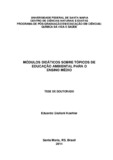| dc.creator | Koehler, Eduardo Giuliani | |
| dc.date.accessioned | 2015-03-30 | |
| dc.date.available | 2015-03-30 | |
| dc.date.issued | 2014-09-30 | |
| dc.identifier.citation | KOEHLER, Eduardo Giuliani. DIDACTIC MODULES ABOUT ENVIRONMENTAL EDUCATION TOPICS FOR HIGH SCHOOL. 2014. 258 f. Tese (Doutorado em Ciências Biológicas) - Universidade Federal de Santa Maria, Santa Maria, 2014. | por |
| dc.identifier.uri | http://repositorio.ufsm.br/handle/1/3541 | |
| dc.description.abstract | This work is a proposal for the insertion of Environmental Education themes
related to the use of chlorofluorocarbons and the ozone layer destruction,
greenhouse effect/global warming, acid rain and water: pollution and treatment as a
reference for Chemistry teachers working in high school. In order to do so, didactic
modules were developed and adapted to the school curricula and also to the
recommendations suggested by the National Curricular Parameters, adopting
necessary requirements for an improved understanding of the environmental
thematic. Thus, the development of such didactic modules is based on the significant
learning by Ausubel, in which the information must interact and be based on relevant
concepts already existent in the cognitive structure of the learner. By doing this, the
material contributes for the presentation of theoretical concepts, experiments
(whenever possible), and analogies about the effects caused by the environmental
problem, describing what is being done to minimize the impacts observed on the
environment and on the society. The didactic modules were provided for a public of
14 Chemistry teachers working in the high school level of federal, state and private
schools of Santa Maria and Porto Alegre, in Rio Grande do Sul. The material has its
structure organized in the development of the environmental thematic and contains
four virtual modules which bring mainly explicatory texts, as well as illustrations and
photos. The research was carried out based on data from questionnaires answered
by the teachers who analyzed the modules. This work is characterized as an applied
research with basic theoretical reference. Its approach is quantitative based on the
Content Analysis by BARDIN (2011). The results of this analysis were considered
favorable to the usage of the modules as a reference for teachers and students as an
opportunity for the insertion of environmental thematic. | eng |
| dc.format | application/pdf | por |
| dc.language | por | por |
| dc.publisher | Universidade Federal de Santa Maria | por |
| dc.rights | Acesso Aberto | por |
| dc.subject | Educação ambiental | por |
| dc.subject | Meio ambiente | por |
| dc.subject | Módulos didáticos | por |
| dc.subject | Environmental education | eng |
| dc.subject | Environment | eng |
| dc.subject | Didactic modules | eng |
| dc.title | Módulos didáticos sobre tópicos de educação ambiental para o ensino médio | por |
| dc.title.alternative | Didactic modules about environmental education topics for high school | eng |
| dc.type | Tese | por |
| dc.description.resumo | O presente trabalho consiste em uma proposta de inserção de temas de
Educação Ambiental, relacionado ao uso de clorofluorcarbonetos e destruição da
camada de ozônio, efeito estufa / aquecimento global, chuva ácida e água: poluição
e tratamento como referência para professores de Química que atuam no Ensino
Médio. Para atender a esse propósito foram desenvolvidos módulos didáticos que se
adaptam aos currículos escolares e orientações sugeridas pelos Parâmetros
Curriculares Nacionais e também, abordam pré-requisitos necessários para o melhor
entendimento da temática ambiental. Logo o desenvolvimento dos módulos didáticos
está amparado na aprendizagem significativa de Ausubel, no qual a informação deve
interagir e apoiar-se nos conceitos relevantes já existentes na estrutura cognitiva do
aluno. Com isso o material contribui para a apresentação de conceitos teóricos,
experimentos quando possível e analogias a respeito dos efeitos gerados pelo
problema ambiental, descrevendo o que está sendo realizado para minimizar os
impactos observados no meio ambiente e na sociedade. Os módulos didáticos foram
disponibilizados para um público de 14 professores de Química que atuam no
Ensino Médio de escolas federais, estaduais e particulares de Santa Maria e de
Porto Alegre, no Rio Grande do Sul. O material tem sua estrutura organizada no
desenvolvimento da temática ambiental, contendo quatro módulos virtuais que
contemplam principalmente textos explicativos com ilustrações e fotos. A pesquisa
foi realizada a partir da coleta de dados de respostas obtidas por questionário
aplicado aos professores que analisaram os módulos, é caracterizada como uma
pesquisa aplicada com referencial teórico básico, quanto à abordagem é classificada
como quantitativa com base na Análise de Conteúdo (AC) de BARDIN (2011). Os
resultados desta análise foram considerados favoráveis à utilização dos módulos
como referencial para docentes e discentes como uma oportunidade de inserção da
temática ambiental. | por |
| dc.contributor.advisor1 | Adaime, Martha Bohrer | |
| dc.contributor.advisor1Lattes | http://lattes.cnpq.br/4385786922516848 | por |
| dc.contributor.referee1 | Soares, Félix Alexandre Antunes | |
| dc.contributor.referee1Lattes | http://lattes.cnpq.br/8752453650114092 | por |
| dc.contributor.referee2 | Carpilovsky, Cristiane Kohler | |
| dc.contributor.referee2Lattes | http://lattes.cnpq.br/4448958129584458 | por |
| dc.contributor.referee3 | Fagan, Solange Binotto | |
| dc.contributor.referee3Lattes | http://lattes.cnpq.br/8537174715205717 | por |
| dc.contributor.referee4 | Rossato, Jussane | |
| dc.contributor.referee4Lattes | http://lattes.cnpq.br/2289911377012512 | por |
| dc.creator.Lattes | http://lattes.cnpq.br/7820052074711646 | por |
| dc.publisher.country | BR | por |
| dc.publisher.department | Educação em Ciências | por |
| dc.publisher.initials | UFSM | por |
| dc.publisher.program | Programa de Pós-Graduação em Educação em Ciências: Química da Vida e Saúde | por |
| dc.subject.cnpq | CNPQ::OUTROS::CIENCIAS | por |


